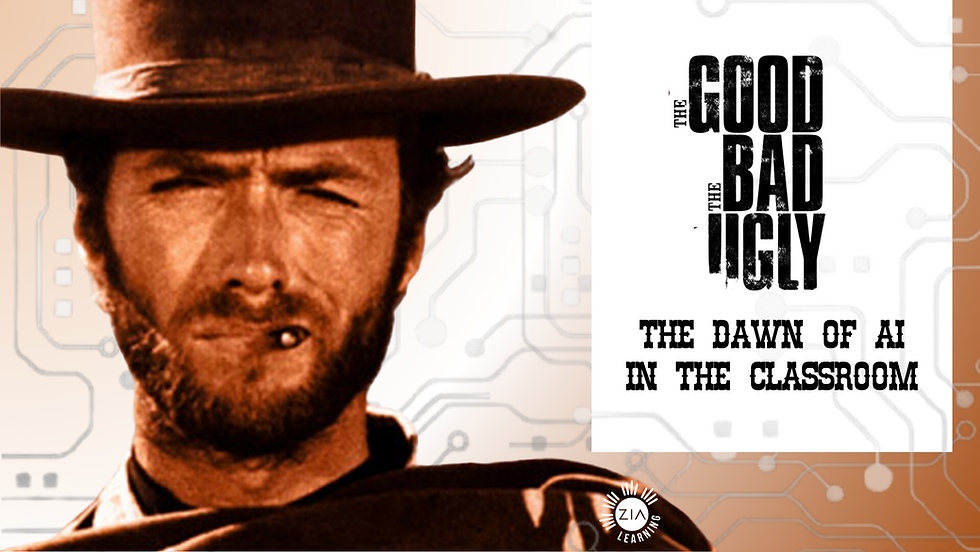The Power of AI in Shaping Virtual K-12 Classrooms
- Robin Gonzales

- Oct 31, 2023
- 3 min read

With technology marching ahead at an unprecedented rate, the education sector, particularly K-12 institutions, isn't far behind in embracing the advancements. At the heart of this transformative journey stands Artificial Intelligence (AI). Its potential influence on virtual classrooms is a topic of intense research and discussion, as highlighted in a recent article by Class found here.
The "eLearning 2.0 Project," spearheaded by Casey Green, founder of The Campus Computing Project, ventures deep into the nexus of AI, next-generation virtual classrooms, and eLearning. His research explores how these state-of-the-art technologies can be pivotal in reshaping teaching paradigms, offering enriched learning experiences, and ultimately benefiting students. Here’s an insight into the transformative facets AI promises for our K-12 schools:
Enhanced Learning Experiences:
The future of personalized education is here with AI. Unlike traditional methods that follow a 'one-size-fits-all' approach, AI curates a learning environment that’s specific to each student. It analyses individual strengths, weaknesses, and preferences. By doing so, AI can fine-tune lesson paces and suggest resources that cater precisely to a student's needs. Imagine a classroom where every learner feels the curriculum is designed just for them; that's the promise of AI.
Data-Driven Insights:
Numbers tell a story, especially in education. With AI, there's potential to turn vast amounts of data into meaningful narratives. These AI-driven platforms assess how students interact with content, the challenges they face, and the areas where they excel. Equipped with these insights, educators can refine their teaching strategies, ensuring that every student is granted the best chance for success.
Increased Academic Integrity:
The digital age presents new challenges, especially concerning the authenticity of online assessments. AI stands as a vanguard, monitoring student activity during online exams or tests. Through advanced algorithms, it can detect anomalies or patterns that suggest dishonesty, ensuring that the accolades students receive are genuinely earned.
Improved Curriculum Design:
The world is in flux, with industries evolving and global standards shifting. AI, with its data-analytical prowess, can anticipate these changes. By processing global educational and industry trends, it can recommend timely curriculum adjustments, ensuring students learn what's relevant today and what will be essential tomorrow.
Efficient Advising and Counseling:
Questions don't follow a timetable. Students might need guidance outside of regular hours. AI-driven virtual advisors are available round the clock, ready to assist with academic queries or career recommendations. They're programmed with vast databases of information and can provide personalized advice instantly.
Support Systems:
In the realm of digital learning, technical hitches or unanswered queries can hamper progress. AI-powered virtual assistants are the support pillars in such scenarios. They're equipped to provide prompt answers, share resources, or guide users through technical challenges, ensuring a seamless learning experience.
Personalized Career Pathways:
AI can deeply analyze the strengths, interests, and future potential of students, helping institutions tailor educational pathways that align with evolving industry demands, thus ensuring students are prepared for the future job market and meeting the expectations of modern-day school superintendents
While the influence of AI in redefining educational dynamics cannot be understated, it's crucial to approach this integration with a balance of enthusiasm and caution. As educators and institutions, the primary focus remains on delivering a holistic, student-centric learning experience. The blend of AI with virtual learning environments is undoubtedly a giant leap in that direction, promising a future where every student receives education tailored to their unique potential.
We welcome your comments and feedback. Was this helpful? Let us know. Be sure to subscribe and share this blog with your colleagues and associates.
Zia Learning help school districts implement personalized, digital, and remote learning to scale. We would love to help you with your project. Give us a call at 847-483-9322.




Comments